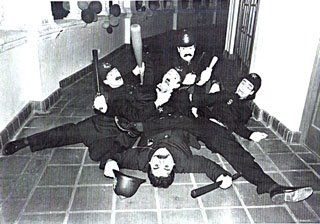Excited Delirium: A Fight With The Devil
Superhuman strength, aggression, violence, paranoia, yelling, bizarre behavior, and hyperthermia. Those are the symptoms of a person in a state of Excited Delirium, a condition that, especially when combined with drug use, can result in death.
Excited delirium is most often associated with users of cocaine, methamphetamine, and PCP, but may surface in non-drug users as well. The condition surfaces suddenly, without warning, and can be extremely terrifying to bystanders and family members.
A person experiencing a bout of excited delirium may experience an alarmingly high heart rate, incoherence, suicidal thoughts, hallucinations, and body temperature to go as high as 108 degrees Fahrenheit. They often feel so hot that they disrobe in an attempt to cool down. Similar conditions are seen in people who use/abuse Bath Salts.
In the past, law enforcement officials simply assumed the violent behavior was the result of drug use and met the suspect’s aggression with the necessary force needed to terminate the threat and effect an arrest.
Typically, to quell extremely violent suspects who are obviously experiencing excited delirium or a similar event, officers employ, for example, the use of Tasers, pepperspray, batons, or the piling on of every officer available (the Polyester Pile). Unfortunately, people have died while being restrained by so many officers at once the case of Eric Garner is a perfect example).
It’s not that officers mean to harm anyone during these attempts to restrain. Not at all. The deaths resulted from officers trying every means possible to gain control of extremely violent and abnormally strong criminal suspects. Again, I cannot stress enough the extreme strength of these individuals. And, they seem to feel no pain whatsoever.
A Polyester Pile (slang) is formed when every officer piles on top of an unruly suspect in order to bring that person’s violent behavior to an end. This is not a method that’s taught in any training. It’s normally a knee-jerk reaction to an action.
Now, as more information comes to light, officers are taking a different approach to handling people in states of excited delirium. And the approach involves careful planning and the assistance of trained medical professionals.
First, officers are trained to recognize the characteristics of the condition. If they determine their suspect is indeed in a state of excited delirium then they should immediately call for back up (4-6 officers are optimum) and emergency medical personnel (local EMS must also be trained and prepared to deal with these situations).
Officers should gain control of the suspect’s arms and legs, immobilizing them. This restraining tactic should be practiced over and over again until they have it perfected. Each man should know what he’s going to do before the technique is initiated (who grabs which arm or which leg). Sure, sometimes it may be necessary to use a Taser, but never after the suspect is on the ground. That’s the time for gaining control of the limbs. Besides, what’s the point of more shocks after a suspect is lying on the ground. Just handcuff them for goodness sake!
Once the suspect has been Tasered and restrained, medical personnel can then administer a sedative, such as Versed (a knock-out type drug used prior to surgery). Then it’s time for an injection of iced saline to keep the body temperature down which prevents overheating (overheating may be the actual cause of death in these situations). Now it’s time for appropriate medical treatment in a hospital, not a trip straight to jail.
Now, after saying all that I have a solution for those of you who have problems with excited delirium…Stop Using Drugs! Your family does not want to attend your premature funeral. Police officers certainly don’t want to be the means of your early demise simply because you couldn’t refrain from smoking crack. I know it’s not easy, but neither is burying someone you care about.
NCADD _ National Council on Alcoholism and Drug Dependence
National Council on Alcoholism and Drug Dependence, Inc.
_________
244 East 58th Street 4th Floor New York, NY 10022
phone: 212/269-7797 fax: 212/269-7510
email: national@ncadd.org http://www.ncadd.org
Have a problem? Please call:
HOPE LINE: 800/NCA-CALL (24-hour Affiliate referral)





